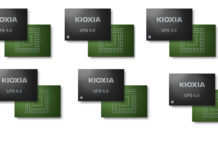There’s a mini-blizzard of Snowflake news — a quadfecta in fact — plus two startups raising cash, Rewind for SaaS application service backup, and Satori for its secure real-time access to data from multiple stacks. We have news about a benchmark bifecta (AI and datacenter) too. We have some TrendForce storage reductions for 2022 and there’s also a truckload of mini news items, including some customer deals and exec hires.
Read on.
Satori fund raiser
Israeli startup Satori, founded in 2019, has raised $20 million in A-round funding.
It is developing a universal data access service to provide real-time access to secured data. It provides a single control plane for real-time data access and usage oversight across data stacks. Think DataSecOps. Satori has multiple out-of-the-box integrations with data stores such as Snowflake, Amazon Redshift, Amazon Athena, Amazon Aurora, and Azure SQL.
The round was co-led by B Capital Group and Evolution Equity Partners, with participation from Satori’s Seed investor YL Ventures. Their cash will pay for R&D and engineering and go-to-market expansion in the USA.
Eldad Chai, co-founder and CEO of Satori, said: “Satori’s platform is the only service able to seamlessly integrate diverse data tech stacks and streamline data access and security without code and without changes to the underlying data stores.”
The other co-founder, CTO Yoav Cohen, said: “We started Satori as we knew cloud data infrastructures would require a radical shift in security toward it being granular, universal and also non-intrusive. Having launched with multiple out-of-the-box integrations with the industry’s leading cloud data stores, such as Snowflake, Amazon Redshift, Amazon Athena, Amazon Aurora, and Azure SQL, we empower data teams to roll out self-service access, row- and column-level security, and dynamic de-identification across data stores in minutes.”
Satori is a Japanese term for understanding.
Rewind fund raiser
Startup Rewind raised a $65 million B-round to further develop its cloud backup and recovery software for business SaaS tools such as BigCommerce, GitHub, QuickBooks Online, Shopify, Shopify Plus, and Trello. It raised $15 million in an A-round in January.
The over-subscribed round was led by Insight Partners with participation from Bessemer Venture Partners, FundFire, Inovia Capital, Ridge Ventures, ScaleUp Ventures, and Union Ventures. Atlassian Ventures made a so-called strategic investment in the round as well.
Mike Potter, co-founder and CEO of Rewind, said: “While we’ve continued to double revenue and software subscribers year over year, every day our team talks with seasoned technology professionals who still do not realise they lack full control of their vital business data. We see tremendous opportunities to backup the entire cloud and are working towards that vision.
“This latest round of funding will allow us to expand our reach, bring additional SaaS backup solutions to the market, and raise awareness for the need to include all cloud and SaaS applications in a business’s backup and recovery strategy.”
Rewind will spend the cash on product development. It already has more than 100,000 customers; the count in January was 80,000-plus. So it’s effectively added 20,000 customers in six months — more than 3000 a month. That’s meteoric growth. You can see why the VCs are excited.
Snowflake news quadfecta
AnalyticsIQ, a provider of predictive marketing data, announced an expanded relationship with Snowflake, which calls itself the Data Cloud company. AnalyticsIQ will make its B2C and B2B data available through the Snowflake Data Marketplace.
Satori recently announcing a partnership with Snowflake to enable DataSecOps for Snowflake’s data cloud. This collaboration has also led to a soon-to-be-released publication, Snowflake Security: Securing Your Snowflake Data Cloud — a comprehensive guide, developed alongside Snowflake, codifying DataSecOps best practices to enable data teams to secure their cloud environment.
Snowflake launched a Financial Services Data Cloud aimed at finance sector customers and their data warehouse and analysis needs. It said businesses can use the Financial Services Data Cloud to launch new products and services, build fintech platforms, and collaborate on data across the enterprise, while meeting regulatory requirements, using Snowflake’s security and governance capabilities.
Snowflake has successfully completed an assessment conducted by KPMG on the 14 Key Cloud Controls for protecting sensitive data, a component of the EDM Council’s Cloud Data Management Capabilities (CDMC) Framework that ensures a comprehensive set of industry standard guidelines for Financial Services organisations and other industries as they move their data into the Cloud. It’s the first cloud platform to be so assessed.
TPC AI benchmark
The Transaction Processing Performance Council (TPC) announced the immediate availability of TPCx-AI, the first industry-standard, vendor-neutral benchmark for measuring real-world AI and ML scenarios and data science use cases. TPCx-AI uses a diverse dataset and was specifically designed to be adaptable across a wide range of scale factors. It provides a means to evaluate performance for the System Under Test (SUT) as a general-purpose data science system that:
- Generates and processes large volumes of data;
- Trains preprocessed data to produce realistic machine learning models;
- Conducts accurate insights for real-world customer scenarios based on the generated models;
- Can scale to large-scale distributed configurations;
- Allows for flexibility in configuration changes to meet the demands of the dynamic AI landscape.
The benchmark measures end-to-end time to provide insights for individual use cases, as well as throughput metrics to simulate multiuser environments for a given hardware, operating system, and data processing system configuration under a controlled, complex, multi-user AI or machine learning data science workload.
TPCx-AI is an executable kit that can be rapidly deployed and measured. It is designed to provide relevant, objective performance data to industry users and is available for download via TPC’s web site.
SPEC datacentre benchmark
The Standard Performance Evaluation Corporation’s (SPEC) Virtualization Committee released the SPECvirt Datacenter 2021 benchmark, a multi-host benchmark for measuring the performance of a scaled-out datacenter. It uses real-world and simulated workloads to measure the overall efficiency of virtualization solutions and their management environments. This new benchmark complements the existing SPECvirt_sc 2013 server consolidation benchmark, which is designed for a single-host environment.
The SPECvirt Datacenter 2021 benchmark feature overview:
- Multi-host benchmark — Minimum of four hosts required, scales in increments of four.
- Datacenter operations model — Multi-workload benchmark measures performance of hypervisor infrastructure, including how the hypervisor manager controls resources.
- Five real-world and simulated workloads —
- OLTP database, based on HammerDB benchmark.
- Hadoop/Big Data cluster, based on BigBench benchmark.
- Simulated departmental mail server.
- Simulated departmental web server.
- Simulated departmental collaboration server.
- VM resource management — Handled by the hypervisor manager, including scheduling policies. Workload VMs powered on or deployed during benchmark.
- Ease of use — Single preconfigured template VM to set up harness and workloads. No tuning of guest OS/software necessary.
The SPECvirt Datacenter 2021 benchmark is available for immediate download from SPEC for $2500. There is a $500 discount for those who already have a copy of the SPECvirt_sc 2013 benchmark until March 2, 2022. Discounts are also available for qualifying non-profit research and academic organizations. Visit the SPEC web site for more information.
TrendForce predictions for 2022
Research house TrendForce says that, while DDR5 products gradually enter mass production, NAND Flash stacking technology will advance past 200 layers.
The three dominant DRAM suppliers (Samsung, SK hynix, and Micron) will gradually kick off mass production of next-gen DDR5 products, and also continue to increase the penetration rate of LPDDR5 in the smartphone market in response to demand for 5G smartphones. With memory speed in excess of 4800Mbit/sec, DDR5 DRAM can massively improve computing performances via their fast speed and low power consumption.
As Intel releases its new CPUs that support DDR5 memory, with Alder Lake for the PC segment, followed by Eagle Stream for the server segment, DDR5 is expected to account for about 10–15 per cent of DRAM suppliers’ total bit output by the end of 2022. Regarding process technologies, Samsung and SK hynix will kick off mass production of 1 alpha nm products manufactured with EUV lithography. These products’ market shares will likely increase on a quarterly basis next year.
Turning to NAND Flash products, their stacking technologies have yet to reach a bottleneck. Hence, after 176L products entered mass production in 2021, suppliers will continue to migrate towards 200L and above in 2022, although these upcoming products’ chip densities will remain at 512Gb/1Tb.
Regarding storage interfaces, the market share of PCIe Gen-4 SSDs will likely skyrocket in the consumer PC segment next year. In the server segment, as Intel Eagle Stream CPUs, which support PCIe Gen-5, enter mass production, the enterprise SSD market will also see the release of products that support this interface. Compared to the previous generation, PCIe Gen-5 features double the data transfer rate at 32GT/sec and an expanded storage capacity for mainstream products at 4/8TB in order to meet the HPC demand of servers and data centers.
Additionally, the release of PCIe Gen-5 SSDs is expected to quickly raise the average data storage capacity per server unit.
Shorts
Cloud backup and storage service provider Backblaze has written a Multi-cloud Architecture Guide. Read about it in a blog. The blog lists several multi-cloud advantages: better reliability and lower latency; redundancy; more freedom and flexibility; affordability; and best-of-breed services.
A Databarracks 2021 Data Health Check survey shows that 15 per cent of organisations are still using a combination of disk and tape backups, with 51 per cent now using online or cloud backups. Cloud and online backups have continued to increase in popularity, climbing from 23 per cent in 2008 to 51 per cent in 2021. Four per cent still use tape as their only backup medium — unchanged since 2012. Combined disk and tape use has declined from a peak of 29 per cent in 2012, to 15 per cent.
Unstructured data migration specialist Datadobi has completed certification by KPMG in accordance with Service Organization Control (SOC) 2 Type I requirements for DobiMigrate’s operations, support, and engineering processes. This helps strengthens Datadobi’s appeal to enterprises. Get a copy of the KPMG report here.
Cloud data protection service provider Datto has announced Datto Continuity for Microsoft Azure, asimple, secure, and reliable business continuity and disaster recovery solution for business infrastructures in the Azure cloud. It’s built on Datto’s flagship BCDR technology, and will provide MSPs the ability to offer data protection, management, and streamlined recovery for their SME clients’ business workloads — at a predictable cost and without the need to piece together individual technologies or depend solely on Microsoft’s data backup services.
DCIG has a report looking at the top five vendors for on-premises NAS consolidation: CTERA, iXsystems, Nasuni, StorONE and WekaIO.
File sharing/collaboration supplier Panzura has launched a Service Hub, complimentary for all Panzura customers, that expands access to customer support and other Panzura services. The company also introduced a bold new corporate brand image, redesigned logo, and web site. Its Chief Services Officer, James Seay, burbled smoothly about this: “For us, there’s no such thing as business as usual. We’re committed to going above and beyond to provide the best customer experience on the planet.” The debut of the Panzura Service Hub is part of an effort to revamp customer programs and processes.
Pliops, developing a storage processor to offload server CPUs, has set up a global channel program. It has implemented a partner assist, channel-centric go-to-market strategy and will strategically align with systems integrators and value-added resellers offering database, analytics, ML/AI, HPC and web-scale solutions, as well as cloud deployments. TD SYNNEX will distribute Pliops’ XDP product in North America. The XDP is now broadly available.
PNY Technologies, a European provider of systems for Artificial Intelligence, HPC, datacenter and professional visualization markets, has announced recently that it has signed a distribution agreement with Nvidia. It has become an Nvidia direct global distributor for the entire range of InfiniBand and Ethernet networking switches, adapter cards/NICs and cables for resellers in EMEA.
US Signal, a Michigan-based IT systems company, has chosen SoftIron as a partner to expand its Ceph-based Storage-as-a-Service infrastructure. The initial implementation, which immediately increases US Signal’s storage capacity by over a petabyte, leverages SoftIron’s Ceph-based HyperDrive storage appliances and is being facilitated with a no-downtime migration across multiple distributed datacenter sites in four midwest states, including Illinois, Indiana, Michigan, and Wisconsin.
As a result of a strong Q3, open-source supplier SUSE expects to report full year adjusted revenue in the top half of the guidance range ($554M to $574M) and adjusted cash EBITDA above the top of the guidance range ($246M to $266M), and still expects to achieve an adjusted EBITDA margin for the year of mid-30s per cent.
Cloud-native data protector Trilio announced the release of TrilioVault for Kubernetes (TVK) v2.5, which offers a comprehensive approach to ransomware protection and recoverability in alignment with the National Institute of Standards and Technology (NIST) Cybersecurity Framework and in support of Zero-Trust architectures. It features backup immutability and encryption. TKV v2.5 also gets multi-namespace backup support, Azure Blob and GCP Object Storage as backup targets, and authentication support supporting OIDC, LDAP and cloud authentication providers.

People
DevOps data supplier Delphix has appointed Josh Harbert as its Chief Marketing Officer. He will be responsible for building a world-class marketing organization, accelerating pipeline generation, amplifying product and brand awareness, and increasing customer engagement with Delphix. His CV shows tenures at Apptio, Qumulo, and most recently, Tanium.
Liqid has hired Steve Tucker as its CFO. The company has doubled its staff year-over-year. He joins Liqid from insurance software provider Vertafore. Liqid has also hired Beth Turman as Executive Director for Public Sector Sales, Gary Billingsley as Director of Federal Sales, and Ben Bolles as Executive Director for Product Management.

MemVerge has hired Bernie Wu as VP of Business Development. He will lead MemVerge’s global alliance, software partnerships and industry ecosystem efforts as well as working to expand vertical market use cases for Big Memory computing using MemVerge’s memory virtualisation technology. Wu comes from Trend Micro with stints at FalconStor, MetalSoft, Levyx, Prophetstor, PiCoral, Cheyenne Software and Conner Peripherals.
Customers
MariaDB Corporation today announced that cloud-based Student Information System provider Campus Cloud Services has migrated to MariaDB SkySQL as its cloud database running on Google Cloud Platform (GCP) and SkyDBA for fractional DBAs with A+ proactive care. Campus Cloud is a cloud service that manages all student data in one place — across admissions, academics, financial aid, accounts and billing, graduation and career placement — for over a hundred thousand students each day and growing.
Platform9, which supplies multi-cloud Kubernetes-as-a-Service, announced that Norna, an applied Artificial Intelligence company, experienced a ten-fold productivity improvement and a 78 per cent total cost of operations (TCO) reduction after implementing Platform9’s Managed Kubernetes-as-a-Service to power the company’s retail fashion AI technology.
Toulouse-based PortAlliance Engineering has become a Qumulo File Data Platform customer. It deployed its first Qumulo array in September 2020 and currently has a capacity of 160TB. PortAlliance Engineering is part of the Airbus group.
The San Francisco 49ers professional football team announced a multi-year partnership with Qumulo to serve as the team’s data storage provider. Qumulo storage will support the 49ers’ operations at Levi’s Stadium and its SAP Performance Facility. A primary use of Qumulo’s storage platform will be extending the storage capacity of security camera feeds captured in and around the 49ers’ home venue and training facility. What previously required 54 individual storage arrays will now be compacted into a single namespace.








